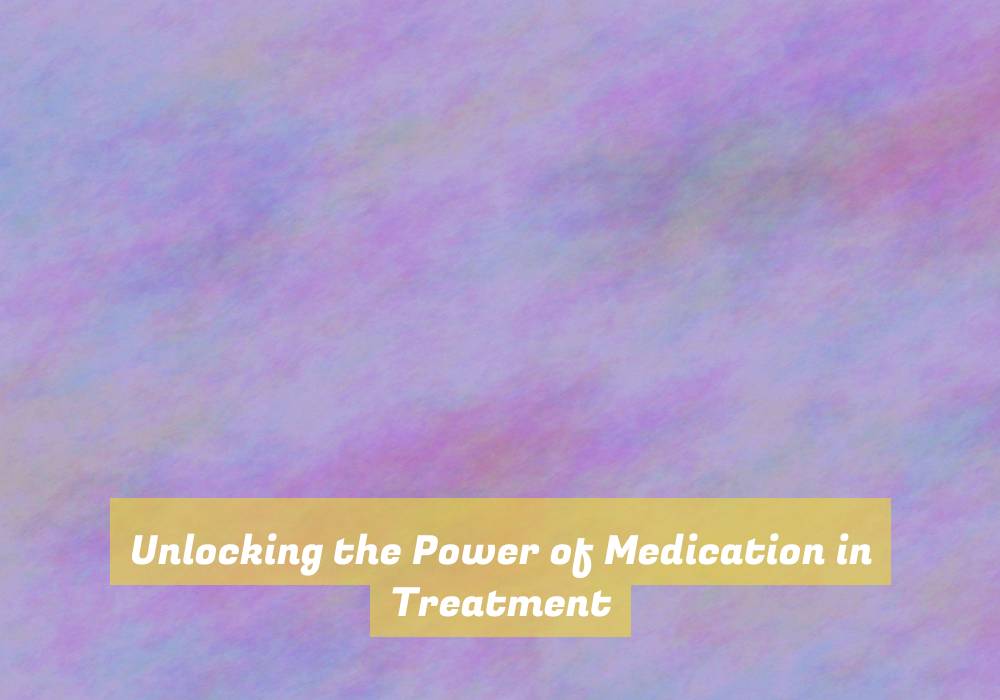Unlocking the Power of Medication in Treatment
YouG??re familiar with the story of Emily, who struggled with severe depression for years, trying various therapies without much success. Then, after starting a new medication, she began to experience a significant improvement in her symptoms and quality of life.
This is just one example of the power of medication in treatment. But how exactly does medication work to alleviate symptoms and promote healing? And what are the key considerations when it comes to integrating medication into a comprehensive treatment plan?
Stay tuned to discover the answers to these questions and more as we explore the impact of medication in unlocking the potential for effective treatment.
The Role of Medication in Treatment
In treating certain conditions, medication plays a crucial role. When youG??re dealing with conditions like depression, anxiety, or bipolar disorder, medication can be a vital component of your treatment plan. These medications work by restoring the balance of chemicals in your brain, helping to alleviate symptoms and improve your overall well-being.
For example, antidepressants can lift your mood, reduce feelings of sadness or hopelessness, and improve your sleep and concentration. Similarly, anti-anxiety medications can help you manage excessive worry, panic attacks, and other debilitating symptoms. In the case of bipolar disorder, mood stabilizers can help regulate the extreme highs and lows, allowing you to lead a more stable and productive life.
ItG??s important to remember that medication isnG??t a one-size-fits-all solution. Finding the right medication and dosage may take some trial and error, and itG??s essential to work closely with your healthcare provider to monitor your progress and make any necessary adjustments.
When used in conjunction with therapy and other forms of support, medication can be a powerful tool in managing your condition and improving your quality of life.
Benefits of Medication in Health Care
When considering the role of medication in treatment, itG??s essential to recognize the numerous benefits it brings to healthcare.
Firstly, medications can effectively manage and alleviate symptoms of various health conditions, promoting a higher quality of life for patients. For example, individuals with chronic pain can experience relief through pain medications, allowing them to engage in daily activities more comfortably.
Additionally, medications play a crucial role in preventing and treating infections, reducing the spread of diseases within communities. They also aid in controlling chronic diseases such as diabetes and hypertension, helping patients maintain stable health and prevent complications.
Moreover, psychiatric medications can significantly improve mental health by stabilizing mood, reducing anxiety, and managing symptoms of depression and other mental illnesses.
Furthermore, medications can sometimes reduce the need for invasive procedures or surgeries, offering a less intrusive and cost-effective treatment option.
Considerations for Medication Use
Considering medication use requires careful evaluation of potential side effects and drug interactions to ensure safe and effective treatment. Before starting any new medication, itG??s crucial to discuss your medical history, current medications, and any known allergies with your healthcare provider. This information helps them determine the most suitable medication for your condition while minimizing the risk of adverse reactions.
Additionally, itG??s essential to adhere to the prescribed dosage and schedule. Deviating from the recommended usage can lead to ineffective treatment or, in some cases, harmful consequences. Always follow your healthcare providerG??s instructions and seek clarification if you have any concerns about your medication regimen.
Furthermore, staying informed about potential side effects and knowing when to seek medical attention is crucial. Some medications may cause mild side effects that typically resolve on their own, while others may require immediate medical attention. Understanding what to expect and when to seek help can help you navigate your treatment more confidently.
Lastly, regular follow-up appointments with your healthcare provider are essential to monitor the medicationG??s effectiveness and address any emerging concerns. Open communication and proactive involvement in your treatment can contribute to better outcomes and overall well-being.
Integrating Medication Into Treatment Plans
To effectively integrate medication into treatment plans, assess your specific medical needs and consult with your healthcare provider for personalized recommendations. Your healthcare provider will consider your medical history, any existing medications, and your individual health goals to tailor a treatment plan that incorporates medication where necessary.
ItG??s important to communicate openly with your healthcare provider about any concerns or preferences you may have regarding medication. Once a medication is prescribed, itG??s crucial to adhere to the prescribed dosage and frequency.
Integrating medication into your treatment plan also involves monitoring and tracking your response to the medication. Be aware of any potential side effects and report them to your healthcare provider promptly.
Additionally, integrating medication into your treatment plan may involve making lifestyle adjustments to complement the medicationG??s effectiveness. This could include changes in diet, exercise, or other habits.
Conclusion
In conclusion, unlocking the power of medication in treatment is essential for maximizing the effectiveness of healthcare. By understanding the role of medication, recognizing its benefits, and carefully integrating it into treatment plans, individuals can experience improved health outcomes.
ItG??s important to consider medication use as a valuable tool in promoting overall well-being and addressing specific health concerns. Embracing the potential of medication can lead to better treatment results and enhanced quality of life.




